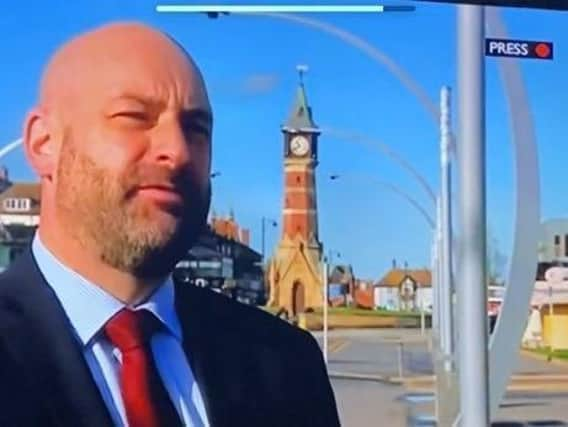Lincolnshire's police commissioner compares people going out without mask to drunks who drive


Speaking to the BBC, PCC Marc Jones said: "It is about doing the right thing.
"People who put others at risk is very similar to people who get drunk and get behind the wheel of a car.
Advertisement
Hide AdAdvertisement
Hide Ad"The people who do these things absolutely need bringing to book - but education is a huge element to prevent this happening in the first place."
Police say the onus is on businesses to remind people about wearing masks and, in general, officers are not seeing non-compliance.
Chief Insp Pat Coates, Specialist Operations: “We continue to engage, explain and encourage.
"Thankfully the vast majority of people respond well to this. Where they don’t we will enforce as a last resort. We are always mindful that many people are exempt from mask wearing.”
Advertisement
Hide AdAdvertisement
Hide AdRecent statistics showed police have issued just one fine in Lincolnshire for not wearing a mask or face covering since wearing one first became mandatory in the summer.
Masks were made compulsory on public transport from June 15, in shops and supermarkets from July 24 and in many other places including cinemas, at a place of worship, hair salons and barbers from August 8.
And staff and customers have been required to wear face coverings indoors in pubs, bars and restaurants unless they are sat at a table to eat or drink since September 24.
Police can issue fines of £200 - reduced to £100 if paid within 14 days - for the first offence of not wearing a face-covering where required to unless exempt.
Advertisement
Hide AdAdvertisement
Hide AdFines are doubled for repeat offenders on subsequent offences up to a maximum of £6,400.
Earlier this month it was revealed Lincolnshire was one of the first police forces in England who had issued fines since face coverings were made compulsory in shops and indoor locations.
According to research by Reboot Digital, out of all 40 police forces in England, Lincolnshire was one of the only ones to enforce the rules within the first month, along with Lancashire and the British Transport Police.
Apparently of the forces that responded, 31 out of 34 police forces in England have not issued a single penalty notice to residents flouting the rules. Boris Johnson’s dad, Stanley, was caught out recently for not wearing a mask in a shop.
Advertisement
Hide AdAdvertisement
Hide AdWith face coverings law on public transport, British Transport Police (BTP) stopped 50,729 people between June 30 and September 8 and reported 3,545 ‘interventions’ where passengers not wearing face coverings were approached and asked to vacate trains.
A total of 51 fixed penalty notices were issued by BTP for offences relating to a lack of face coverings on public transport.
In total, the BTP has accrued £5,100 in penalties up until August 18, according to the figures.
The cumulative totals for the past five months, according to the NPCC are:
May – 221
June – 233
July – 239
August – 236
September – 237
GOVERNMENT GUIDANCE OF FACE MASKS
Advertisement
Hide AdAdvertisement
Hide AdIn England, you must wear a face covering in the following indoor setting:
- taxis and private hire vehicles (PHVs)
- transport hubs (airports, rail and tram stations and terminals, maritime ports and terminals, bus and coach stations and terminals)
- shops and supermarkets (places which offer goods or services for retail sale or hire)
- shopping centres (malls and indoor markets)
- auction houses
- premises providing hospitality (bars, pubs, restaurants, cafes), except when seated at a table to eat or drink (see exemptions)
Advertisement
Hide AdAdvertisement
Hide Ad- post offices, banks, building societies, high-street solicitors and accountants, credit unions, short-term loan providers, savings clubs and money service businesses
- estate and lettings agents
- theatres
- premises providing personal care and beauty treatments (hair salons, barbers, nail salons, massage centres, tattoo and piercing parlours)
- premises providing veterinary services
- visitor attractions and entertainment venues (museums, galleries, cinemas, theatres, concert halls, cultural and heritage sites, aquariums, indoor zoos and visitor farms, bingo halls, amusement arcades, adventure activity centres, indoor sports stadiums, funfairs, theme parks, casinos, skating rinks, bowling alleys, indoor play areas including soft-play areas)
- libraries and public reading rooms
- places of worship
- funeral service providers (funeral homes, crematoria and burial ground chapels)
- community centres, youth centres and social clubs
- exhibition halls and conference centres
- public areas in hotels and hostels
- storage and distribution facilities
Advertisement
Hide AdAdvertisement
Hide AdPeople are expected to wear a face covering before entering any of these settings and must keep it on until you leave unless there is a reasonable excuse for removing it.
They should also wear a face covering in indoor places not listed here where social distancing may be difficult and where you will come into contact with people you do not normally meet.
EXEMPTION CARDS
Those who have an age, health or disability reason for not wearing a face covering should not be routinely asked to give any written evidence of this, this includes exemption cards. No person needs to seek advice or request a letter from a medical professional about their reason for not wearing a face covering.
Some people may feel more comfortable showing something that says they do not have to wear a face covering. This could be in the form of an exemption card, badge or even a home-made sign.
This is a personal choice and is not necessary in law.
* There will be more from the PCC on BBC1's Politics North on Sunday at 10am.